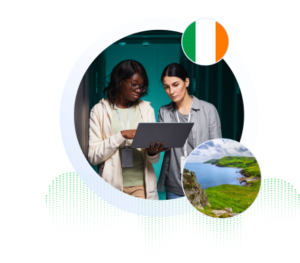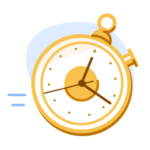Are you considering becoming an international student in Ireland? Below, we’ll look at how to work in Ireland while studying. Read on to see what your study abroad timeline might look like, and how your work opportunities can change over time. We’ll start with your international student enrollment, and end with how you can gain work experience after graduation.
Short on time? Jump to the answer you need by clicking on these links:
- Which students may work while studying in Ireland?
- How does the NFQ work?
- How do I prepare for and find work?
- What if I have an internship? How does that work?
- How many hours can I work per week?
- Can I work in Ireland after graduation?
Considering other study countries? We’ve also got work-while-studying guides for Canada and the United States.

Which Students May Work While Studying in Ireland?
International students usually enter Ireland with Immigration . As an international student, you may work only as long as your Stamp 2 visa is valid. Once it expires, you may no longer work in Ireland.
If you’re enrolled in a full-time course that leads to a qualification recognized by the that’s at least one year long, you don’t need a work permit.
Per , to work in Ireland as an international student, you must be:
- �����鶹ed with the Garda National Immigration Bureau (GNIB) of receiving your permission to stay in Ireland.
- Or, if you’re staying inside Dublin city/county, you must register with Immigration Service Delivery (ISD) instead of GNIB.��
- In a full-time programme (aka course of study) that’s at least one year long, and at or above NFQ Level 7.
- Working toward a qualification recognized by the Minister for Education and Skills.
- Undertaking a minimum of 15 hours per week of daytime study.
- Attending classes between the hours of 8:00 AM and 6:00 PM for a minimum of 25 weeks per year.
NFQ, Explained
If you read through that list and are wondering “what does NFQ Level 7 mean?”, it refers to levels of study. Ireland’s (NFQ) has ten levels. It’s a good resource for understanding the skills and knowledge you’ll need to earn a qualification. On the NFQ scale, third-level qualifications, or post-secondary studies, range from levels 6–10.��
So, which courses match which levels?
- Level 6: Advanced Certificates and Higher Certificates
- Level 7: Ordinary Bachelor’s Degrees
- Level 8: Honours Bachelor’s Degrees and Higher Diplomas
- Level 9: Master’s Degrees and Post-Graduate Diplomas
- Level 10: Doctoral Degrees (PhD) and Higher Doctorates
Students in courses ranked 7 to 10 on the NFQ scale may work while studying abroad in Ireland.
Bonus Resource: If you want to know how your current credentials match up to Irish ones, check out NARIC Ireland’s searchable . It compares qualifications from 160+ countries to Irish courses.
Want to learn about study and career opportunities in Ireland from real study abroad experts?

How Do I Prepare for and Find Work in Ireland?
Before you start working, you’ll need to get a (PPS Number), and an Irish bank account. The PPE Number is used by your employer to pay you.��
If your course is accredited by Quality and Qualifications Ireland (QQI), you may already have received a PPS number, so check your acceptance package.��
On-Campus Jobs
Many international students like the convenience of working on campus. You might find work in the library, as a research or teaching assistant, in administration, or with a private on-campus business. To find on-campus jobs, check your campus’ student services office or website.��
Off-Campus Jobs
For off-campus jobs, check websites like or . It’s a good idea to check in with your campus career centre when job hunting off-campus, too. They’ll know good local businesses to apply for, and can help you polish up your resume, or practice interview skills.
Note: When looking for work, keep in mind that Ireland’s minimum wage (as of January 2023) is . Don’t accept a lower wage. Also, Ireland does not have a lower “tipping wage,” which is where some employees earn a lower base salary which is supplemented by tips. As of December 2022, it is “” in Ireland.
Ace your job interviews with these interview tips for international students.��

What if I Have an Internship in My Programme?
If you plan to pursue an internship or work placement, there are a few things you should know.��
- Your academic institution must ensure the placements complement the programme you’re in.��
- Work placements must be a central part of the programme, but cannot be longer than 50% of its length. (So, a three-year programme may have a placement or placements that is collectively up to one and a half years long.)
- Self-employment doesn’t count as a work placement or internship.
What’s the difference between co-ops, internships, and field placements?

How Many Hours Can I Work Per Week?
For most of the year, if you’re a student with Stamp 2, you may work 20 hours per week. However, during the summer months (June–September) and from December 15–January 15, you can work 40 hours per week.��
Be strategic—use the skills you pick up in your part-time job to prepare for one of Ireland’s most in-demand careers.

Can I Work in Ireland After Graduating?
You may be eligible to stay in Ireland after you graduate, and pursue your career under the Irish , if you graduate from a course ranked 8, 9, or 10 on the NFQ scale.
The Third Level Graduate Scheme allows non-EU post-secondary graduates to look for work or apply for a work permit. The may depend on the course you’ve taken.��
Level 8 Graduates
Generally, non-EEA students who graduate from a Level 8 course may stay in Ireland for up to 12 months.��
Level 9 or 10 Graduates
Graduates with a Level 9 or 10 course may stay for 24 months. If you’re accepted to the Third Level Graduate Scheme, you may work full-time (40 hours/week).
Remember: You’ll have limited time to find a job after finishing your course, so we recommend applying for jobs well before graduating.
With Ireland’s status as a tech hub on the rise, there are lots of great job opportunities for international student graduates, especially those in STEM fields.

We hope this information on how to work while studying in Ireland is helpful as you plan your journey as an international student.
Please note that this post is not meant as official immigration or residency advice. For the most-up-to-date information, please visit the official page. If you’re interested in learning about ways to stay in Ireland after graduation, please contact an Irish immigration attorney.
Ready to study abroad? With over 140,000 courses offered, there’s bound to be one that fits your goals.







